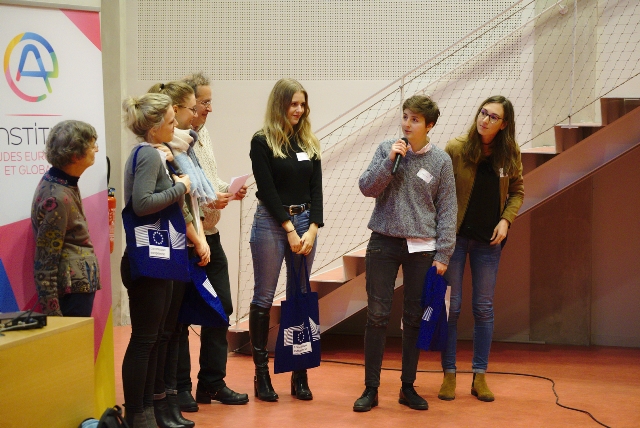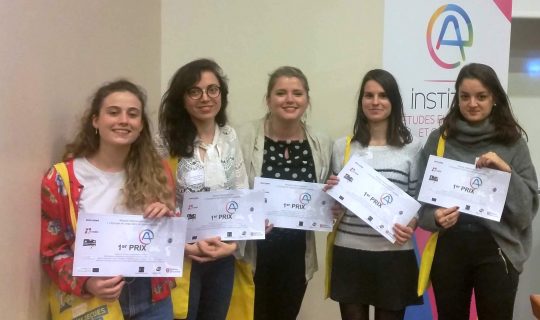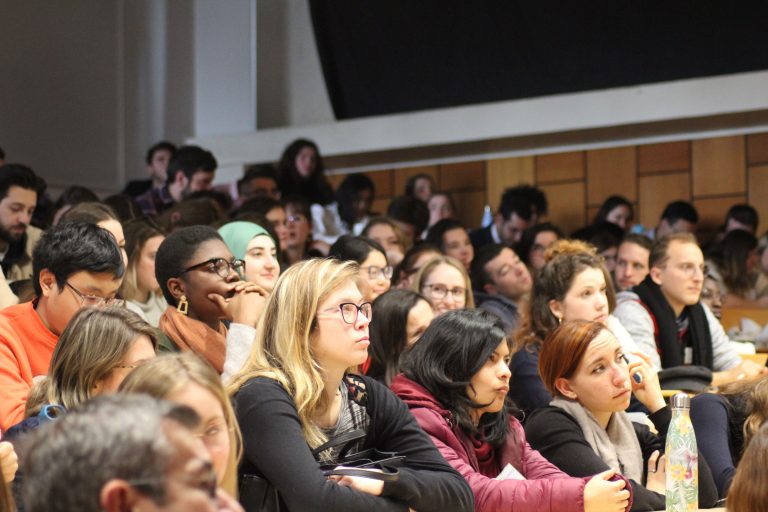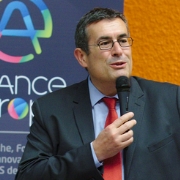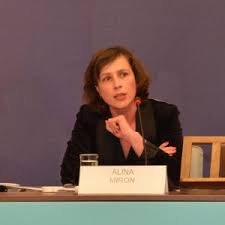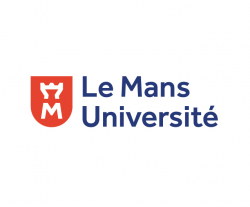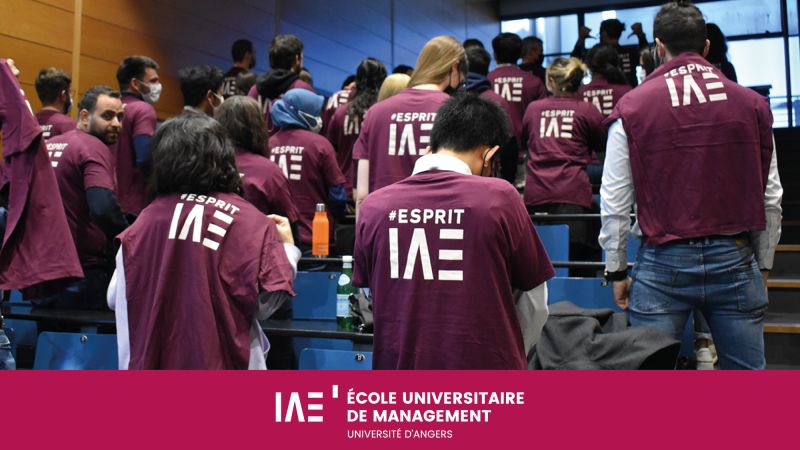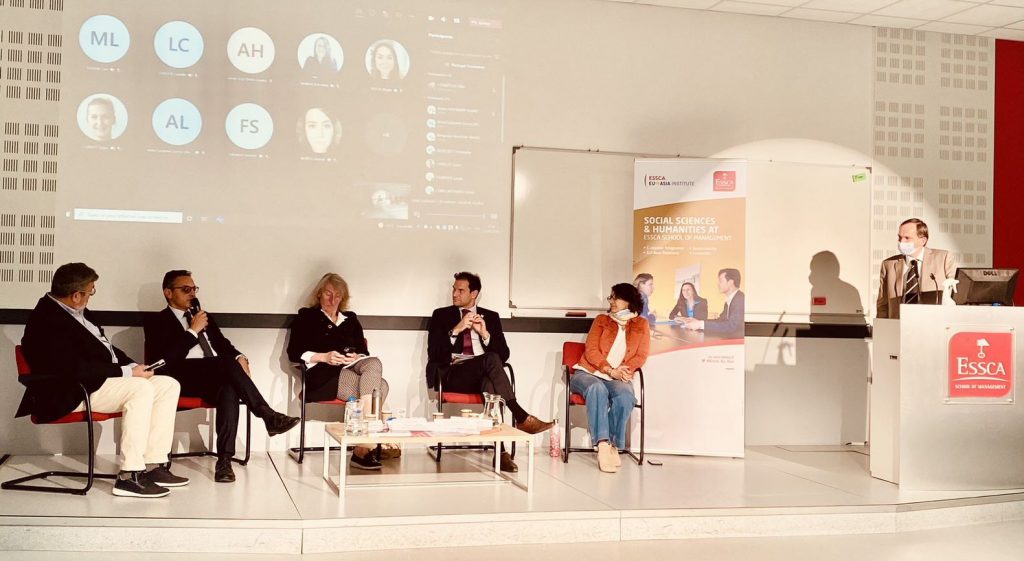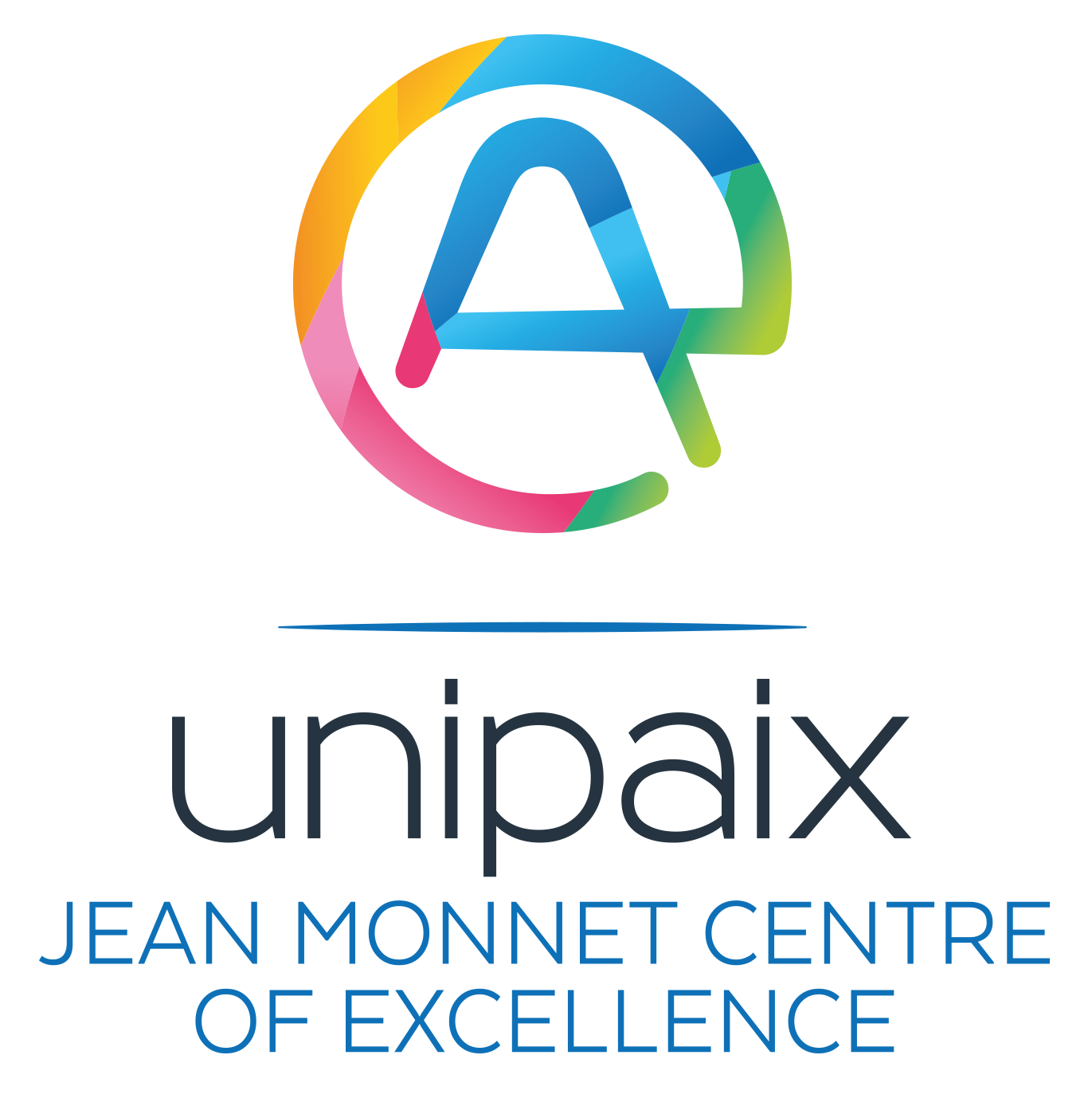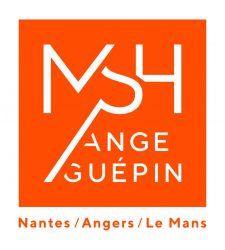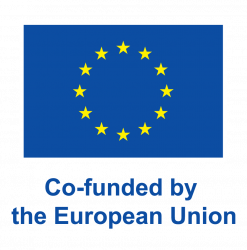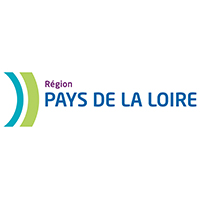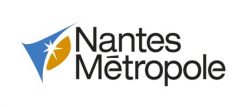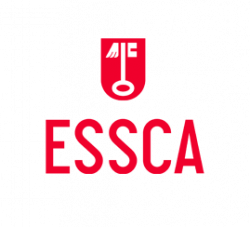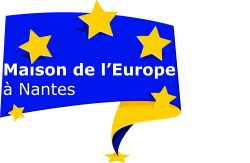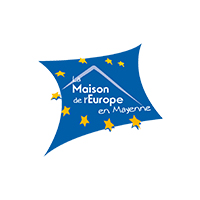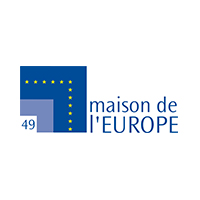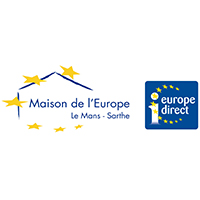From the 2017/2018 academic year onwards, an innovative interdisciplinary module on “Europe in Crisis in the Globalised World” will be offered to first year master’s students from the 10 different tracks that are included in the Alliance Europa Consortium at the universities of Nantes, Angers and Le Mans.
Whether these students major in international law, political science, history, languages and cultures, international management or economic intelligence, the content will be the same for all, with the hope that these students will develop an interdisciplinary outlook on a variety of topics relating to the current state of Europe.
This innovative project received European funding in the context of the Erasmus+/Jean Monnet program. It was the only Jean Monnet module to be selected in France in 2017.
Learn More about the Erasmus + Projects at Nantes University (French content)
Presentation
Several sub-modules are offered for students to choose from:
- Questioning the Idea of Europe
- Europe, a land of exile and migration
- Entering or leaving the Union: what are the stakes for Europe?
- Citizenship, democracy and diversity in Europe
Each one is composed of 10 educational sequences dealing with the subject from different disciplinary points of view (law, economics, literature, history, British civilization...) with a video clip, an MCQ and a list of resources to go deeper into the subject. Students are then asked to work in groups, by degree, to elaborate a final production in a format of their choice (video, audio, blog post, etc.).
This module is intended for students of the following masters:
At the University of Nantes:
- European and International Law
- European Political Science
- Engineering in European and international projects
- International relations and conflicts in Europe and the Atlantic world from the antiquity to the present day
- Cultural mediation and international communication
- Analysis of cultural practices
At the University of Angers :
- International and European Law
- Economic intelligence and internationally competitive strategies
- Management and international trade
- Law and Finance
At the University of Le Mans :
- International Cultural Studies
Course calendar
This course is largely taken remotely through the Extradoc platform of the University of Nantes. Three face-to-face moments are also planned for students to meet:
- Opening: the presentation of the course will be organised at the beginning of the semester at each university
- Evaluation : students meet in their degree categories at the end of the module to assess group works (peer assessment)
- Final gathering: the students, who all took the course in one of the three sites, gather together. This allows them to meet and to present the best productions from each degree category to a jury composed of Alliance Europa non-academic partners (such as Maisons de l’Europe ligériennes, Euradionantes). The productions selected by the final jury are to be published or promoted on the websites of the civil society partners.
The teaching content was designed by a team of 13 lecturer-researchers, all experts in European issues at Nantes, Angers and Le Mans. Carole Billet, lecturer in public law at the University of Nantes and Alina Miron, professor in public law at the University of Angers each managed the pedagogical coordination of one of the sub-modules.
The technical services (the audio-visual and media department in Nantes, the Lab’UA in Angers and the digital resources department in Le Mans) created the video segments. Alliance Europa coordinated the project as a whole.
Content
During the 2017/2018 academic year, students can choose from the following themes:
- Questioning the Idea of Europe
- Sequence 1: The Republic of Letters and the Idea of Europe (Sylvie Servoise, literature)
- Sequence 2: Europe in Crisis in the Mirror of Writers (twentieth and twenty-first centuries) (Sylvie Servoise, literature)
- Sequence 3: National Cultures and European Civilisations (Tristan Storme, political science/philosophy
- Sequence 4: The European Identity after the Nationalisms (Tristan Storme, political science/philosophy)
- Sequence 5: A Supranational Europe or a Europe of the States? (Stanislas Jeannesson, history)
- Sequence 6: A European Europe or an Atlantic Europe? (Stanislas Jeannesson, history)
- Sequence 7: What type of Actor is the European Union on the International Scene? (Carole Billet, law)
- Sequence 8: Thinking of Europe in an Economy of Globalised Knowledge (Camille Baulant, economics)
- Sequence 9: Single Market, Industrial Polarization and the Euro Crisis (David Cayla, economics)
- Sequence 10: Differentiation: a Relevant Path to Pursue Integration in the European Union (Carole Billet, law)
- Europe, a Land of Exile and Migration
- Sequence 1: History of Forced Migrations and of Refugees in Europe in the Twentieth Century - Part 1 (Michel Catala, history)
- Sequence 2: History of Forced Migrations and of Refugees in Europe in the Twentieth Century - Part 2 (Michel Catala, history)
- Sequence 3: Migratory Movements in Europe (Chadia Arab, geography)
- Sequence 4: Migrants: Asset or Impairment for the European Economy? (Catherine Crapsky, Management/Finance)
- Sequence 5: The Statuses of Migrants in Europe (Alina Miron, law)
- Sequence 6: Schengen (Yves Pascouau, law and political science)
- Sequence 7: Immigration and what it means to be British (Maud Michaud, British civilisation)
- Sequence 8: Britain, Immigration and Brexit (Maud Michaud, British civilisation)
- Sequence 9: The Sublime Porte at the Doors of Europe (Alina Miron, law)
- Sequence 10: The French Path for Asylum Seekers (Bérangère TAXIL, law)
3. Entering or leaving the Union : what are the stakes for Europe
- Sequence 1: The Republic of Letters and the Idea of Europe (Sylvie Servoise, literature)
- "EU enlargements through history" (Michel Catala, history)
"Brexit/United Kingdom: The driving forces behind the vote in favor of Brexit in England" (Laetitia Langlois, British civilization)
- "Brexit and Northern Ireland” (Charlotte Barcat, British civilization)
"The impact of Brexit on Scotland's place in Europe as well as in the United Kingdom" (Annie Thiec, British civilization)
"Reluctant Europeans? The UK and the EU 1945-1975" (Maud Michaud, British civilization)
- "Future enlargements of the EU" (Anna Maslon Oracz, economics)
"The consequences of Brexit on EU environmental policy" (Aurélien Evrard, political science)
- "The legal consequences of Brexit" (Araceli Turmo, law)
- "The Catalan issue" (Fernando Guirao, economy/political science)
4. Citizenship, democracy and diversity in Europe
- "Europe, the Europeans and migrations" (Denis Duez, political science)
- "Minorities and discrimination" (Aurélie Laurent, law)
- "Democracy in crisis and new expressions of citizenship" (Félicien Lemaire, law)
- "European defence, a beautiful, impossible idea ? "(Frédéric Gloriant, history)
- "Environmental protection and the climate issue" (Sylvie Nail, British civilization)
- "Populisms in Europe" (Emmanuelle Reungoat, political science)
- "Media(s) and public space(s) in Europe" (Arnauld Leclerc, political science)
- "Gender and discrimination" (Clémence Ledoux, political science)
- "Europe and the terrorist threat" (Jenny Raflik, history)
- "Citizenship, identity and European integration" (Michel Catala, history)
News
The 1st edition of the Jean Monnet joint interdisciplinary module on “Europe in crisis in a globalized world”, launched at the beginning of the 2017/2018 academic year, ended on Friday, December 8, 2017 with a reunion of all the students who took the course. Some 130 students from ten Master’s courses at the Universities of […]
The 2nd edition of the Jean Monnet Joint Interdisciplinary Module on “Europe in Crisis in a Globalized World” closed on Thursday, December 6, 2018 with a large gathering of all the students who attended the course. Some 200 students from 11 Master’s courses from the Universities of Nantes, Angers, Le Mans and Bologna in Italy […]
On December 10, 2019, professionals, teachers and students in European issues met at the University of Le Mans for the third edition of the final gathering of the common interdisciplinary module “Europe in crisis in a globalized world”, organized by Alliance Europa. This e-learning module is intended for about 200 first-year Master’s students, coming from […]
Coordinators
MICHEL CATALA
Professor of Contemporary History at the University of Nantes - Director of the Institute for European and Global Studies.
CAROLE BILLET
Lecturer in European Union Law at the Law and Social Change Laboratory - University of Nantes
Research themes :
– The differentiated participation of Member States in the European Union’s action on the international scene
– Decentralised agencies and the EU’s external action
– EU action in the field of migration and asylum
– Cultural law in the European Union
Responsibilities :
– Head of the “Justice, Trial, Procedure” Master’s degree (2nd year) (Pre-ENM) in Nantes
– Co-head of European Union Law Master’s degree (2nd year)
– Member of the Education and University Life Commission
Carole Billet is developing the research project “Legal studies on the European Union as an area of freedom, security and justice”, with the support of Alliance Europa.
She is also one of the leader of the project “The reception and resettlement of refugees in Europe: categorisation and operationalisation (ARRECO)”.
ALINA MIRON
Associate Professor of Public International Law at the Jean Bodin Centre, University of Angers
Her research focuses more specifically on the law of the sea, international litigation, targeted sanctions and the application of international law in the domestic legal order. She also works as a legal consultant.
– Within Alliance Europa:
Alina Miron is the initiator of the project: “The sea as last frontier? Towards an observatory of maritime litigation”, financed by the Attractiveness programme of Alliance Europa.
She is co-director of the Master 2 in International and European Law and takes part in education activities supported by Alliance Europa, such as the interdisciplinary module (coordination of sub-module 2: Europe, a land of exile and migration). In 2018, she organised in Angers the Concours Rousseau, the most important international mooting competition in the French-speaking world.
MAUD MICHAUD
Lecturer in British civilization at the University of Le Mans
She is interested in British Protestant missionary societies and their strategies of implantation in the African colonies of the European powers, in the context of colonial rivalries of the 19th and 20th centuries. More recently, her research has focused on European networks of scientific collectors, particularly in the field of anthropology, and the role that missionaries stationed abroad may have played in the creation of major European museums and galleries in the 19th and 20th centuries.
– Within Alliance Europa
Maud Michaud participates in the training actions supported by Alliance Europa such as the interdisciplinary module for which she is the pedagogical coordinator of sub-module 3 “Entering or leaving Europe”.
Support
Jean Monnet Programme
Created in 1989, the Jean Monnet Programme aims to stimulate excellence in teaching and research on the European Union, all over the world.

The programme was integrated into the Erasmus + programme in 2014, and supports several types of actions: Jean Monnet chairs, centres of excellence or teaching modules, but also multilateral projects and research groups.
A Jean Monnet Chair is awarded for a period of 3 years to a university professor specialising in European Union studies, who receives a maximum support of €50,000 from the European Commission for the implementation of his or her teaching and research activities.
For more information on the Jean Monnet programme, its objectives and the activities it finances, please visit the website of the Erasmus+ France Education and Training Agency and the EACEA website.
https://eacea.ec.europa.eu/erasmus-plus/actions/jean-monnet_en
The European Commission's support for the production of this publication does not constitute an endorsement of its contents, which reflects the views only of the authors, and the Commission cannot be held responsible for any use which may be made of the information contained therein.
Partners
Nantes University
Nantes University offers courses from bachelor’s to master’s degrees and excellence research projects concerning Europe in a wide range of disciplines in the humanities and social sciences.
It is home to the Institute for European and Global Studies, which implements the Alliance Europa programme.
https://www.univ-nantes.fr
Faculty of Arts, Languages and Human Sciences – University of Le Mans
Faculty of Arts, Languages and Human Sciences – University of Le Mans
The Faculty of Arts, Languages and Humanities is one of the six components of the University of Maine, including the IUT (University Institute of Technology).
It offers numerous courses from the Bachelor’s to the Master’s level in the following two areas: Arts, Humanities, Languages, and Human and Social Sciences. It is mainly characterized by its human dimension, with nearly 2500 students enrolled in the three university cycles, and by the quality of its training offer.
http://lettres.univ-lemans.fr/fr/index.html
http://lettres.univ-lemans.fr/fr/index.html
Faculty of Law, Economics and Management – University of Angers
Faculty of Law, Economics and Management – University of Angers
The Faculty of Law, Economics and Management of the University of Angers is a teaching and research unit of some 3000 students, that provides all the usual training courses in these disciplines.
In addition, it has developed its own specificities as concerns the content of the courses taught and the methods used.
The teaching of foreign languages forms an important part of the general bachelor, notably in order to prepare the students for the classes taught in English at Master’s level. Individual support (via a tutor, a “big brother”, a referent teacher, etc.) helps students to development their own projects. Professional licences have been created in partnership with the local economic actors (territorial public administration, clothing industry, SMEs and SMIs, notaries, etc.).
The vast majority of master’s degrees specialise in growing professional sectors: banking and finance, international human resources, international management, economic intelligence, corporate law, etc. These courses are backed by two legal, economic and management research laboratories with 88 lecturer-researchers and 90 doctoral students whose fundamental and applied research work is the subject of contracts.
http://www.univ-angers.fr/fr/acces-directs/facultes-et-instituts/faculte-droit-economie-gestion.html
Faculty of Law and Political Science of the University of Nantes
Faculty of Law and Political Science of the University of Nantes
Located on the Tertre campus, the Faculty of Law and Political Science is one of the most important department of the University of Nantes.
The diversification of the courses offered, the regular collaborations between teachers and professionals, the originality and recognition of the research carried out there, the constant international opening and the skills of all the staff attract a growing number of students.
It is also present on the La Roche-sur-Yon site.
http://www.droit1.univ-nantes.fr/
Faculty of Foreign Languages and Cultures – University of Nantes
Faculty of Foreign Languages and Cultures – University of Nantes
The Faculty of Foreign Languages and Cultures has been an integral part of the Humanities and Social Sciences campus in Nantes since 1996. This component, one of the most important of the University (3000 students on average each year), is a rich and diverse community, as illustrated by its twofold structure (Foreign Languages, Literature and Cultures/Applied Foreign Languages) and its seven departments (Arabic, English, German, Spanish, Italian, Portuguese, and Slavic and Oriental languages – Russian, Chinese, Japanese).
The Faculty of Foreign Languages and Cultures has an international dimension (through numerous collaborations with foreign universities) and is open to the cultural life of the city (music festivals, theatre, video, cinema, exhibitions, etc.).
http://www.flce.univ-nantes.fr/
Faculty of History, History of Art and Archaeology – University of Nantes
Faculty of History, History of Art and Archaeology – University of Nantes
Located on the Tertre campus in Nantes, the UFR of History, Art History and Archaeology aims to train students by offering Bachelor’s, Master’s and Doctorate degrees and to develop a research policy at national and international level.
http://www.histoire.univ-nantes.fr/
University of Angers
The University of Angers offers master courses in law, economics and management and contributes to the research areas of the Institute for European and Global Studies.
http://www.univ-angers.fr/fr/index.html
Le Mans Université
The University of Le Mans contributes to the research lines of the Institute for European and Global studies and to the education offer on European culture(s).
http://www.univ-lemans.fr/en/index.html

